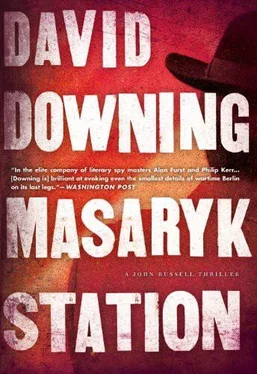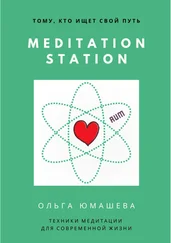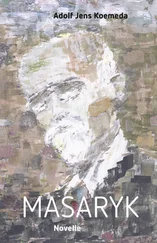David Downing - Masaryk Station
Здесь есть возможность читать онлайн «David Downing - Masaryk Station» весь текст электронной книги совершенно бесплатно (целиком полную версию без сокращений). В некоторых случаях можно слушать аудио, скачать через торрент в формате fb2 и присутствует краткое содержание. Год выпуска: 2013, ISBN: 2013, Издательство: Soho Press, Жанр: Шпионский детектив, на английском языке. Описание произведения, (предисловие) а так же отзывы посетителей доступны на портале библиотеки ЛибКат.
- Название:Masaryk Station
- Автор:
- Издательство:Soho Press
- Жанр:
- Год:2013
- ISBN:9781616952228
- Рейтинг книги:4 / 5. Голосов: 1
-
Избранное:Добавить в избранное
- Отзывы:
-
Ваша оценка:
- 80
- 1
- 2
- 3
- 4
- 5
Masaryk Station: краткое содержание, описание и аннотация
Предлагаем к чтению аннотацию, описание, краткое содержание или предисловие (зависит от того, что написал сам автор книги «Masaryk Station»). Если вы не нашли необходимую информацию о книге — напишите в комментариях, мы постараемся отыскать её.
Masaryk Station — читать онлайн бесплатно полную книгу (весь текст) целиком
Ниже представлен текст книги, разбитый по страницам. Система сохранения места последней прочитанной страницы, позволяет с удобством читать онлайн бесплатно книгу «Masaryk Station», без необходимости каждый раз заново искать на чём Вы остановились. Поставьте закладку, и сможете в любой момент перейти на страницу, на которой закончили чтение.
Интервал:
Закладка:
The lieutenant stared at the picture once more, probably hoping to find a flaw, and then abruptly made for the door. ‘Return the pass to the Miramar HQ as soon as you get back,’ was his parting shot.
Russell lifted his battered suitcase on to the bed, and added a change of clothes to the documents in the bottom. He wasn’t that sorry about the jeep-he had always loved sitting in trains-but the journey would probably now take most of the day, and he ought to be on his way.
The walk to the station took fifteen minutes, the wait for a train considerably longer. A Venice service eventually carried him up the coast to the Italian border, where the guard demanded payment for an onward ticket to Udine. A change was required at Monfalcone, where a three-hour wait allowed him time to find a reasonable lunch. It was almost three by the time his connection-two ancient coaches behind a rusty tank locomotive-started off up the Isonzo valley, skirting the first of what soon seemed an endless series of First War cemeteries. After a lengthy stop in Gorizia, the train slowly puffed its way northwestward across the southern edge of the Alpine foothills, crossing stream after swollen stream rushing south toward the sea. Once Russell allowed himself to accept the lack of haste, he found himself enjoying the journey-after Trieste and its ludicrous politics, here was the earth reborn again, with all the bright greens of spring.
He had never been to Udine, which was larger than he’d imagined, and seemed, from the back of a cab at least, to be blessed with a wealth of interesting architecture. Another time perhaps.
The Hotel Delle Alpi was impressive, and more luxurious than he’d come to expect when American Intelligence was footing the bill. It and its proprietor, who introduced himself as Boris, and who looked more German than Italian, had survived the war apparently unscathed, a circumstance that Russell always-and, he admitted, often unfairly-considered grounds for suspicion.
Only one room had been booked for himself and Mister Balanchuk, which was much more in line with the usual stingy CIC practice. And it was barely big enough for two, let alone the three which Boris suggested. The rooms on either side were taken, but after only a brief show of annoyance, the proprietor found him two adjoining rooms farther down the corridor. Babysitting a human monster was bad enough, and Russell was damned if he was going to share a bed with him.
The hotel restaurant looked less than inspiring, but it was already growing dark outside, and he supposed he should be there when Palychko arrived. As it happened, the food was exquisite, the wine as good as any he’d drunk since pre-war days. Russell lingered over coffee and brandy, reading with one ear cocked for a vehicle outside, but when the lobby clock chimed eleven he decided to call it a day.
It felt like he’d only just closed his eyes when someone knocked on his door. ‘Your friends have arrived,’ Boris half-shouted.
Two apparent soldiers were drinking in the bar, one a CIC Major whom Russell recognised from a meeting in Salzburg a year or so earlier, the other Maksym Palychko, who was dressed as a GI corporal. He was shorter than Russell had imagined from the picture, with an unexpectedly appealing smile. The long white scar on the neck seemed the only predictable thing about him.
They all shook hands like civilised people, and the Major-whose name, Russell remembered, was Hanningham-poured Russell a generous measure of Scotch.
‘Any problems?’ Russell asked, for want of anything better.
‘None,’ the Major said cheerfully. ‘I think everyone manning that border is on our payroll.’
Palychko was looking around the empty bar.
Russell introduced himself in Russian. ‘Or would you rather use German?’ he added in that language.
‘ Deutsch,’ the Ukrainian said shortly. He drained his glass. ‘It’s been a long day,’ he added.
Either Hanningham had no qualms about sharing the bed ‘big enough for three’ with Palychko, or he was too tired to care, and soon Russell was lying in his own. They met again at breakfast in the wood-panelled dining room with its distant view of the mountains, and after half an hour of Hanningham’s overweening arrogance, Russell was beginning to wonder which man was the more objectionable of the two. The mass murderer Palychko just sat admiring the view, offering the occasional friendly smile. Only when the American’s jeep had finally shrunk to a dot on the road heading north, did he offer more than a single syllable. ‘Where did you spend the war?’
Russell had no desire to tell this man his life story. ‘In the States, and then with the US Army in France and Germany, as a war correspondent.’ All of which was true enough, if hardly the complete picture. ‘How about you?’
‘In Poland and Ukraine.’
‘Doing what?’
‘Fighting communists. And losing.’
‘Any regrets?’ Russell couldn’t help asking.
‘You know who I really am, don’t you?’
‘Yes.’
He offered up that smile again. ‘That’s more than I do.’
Oh shit, Russell thought, a psychopath with an identity crisis.
It must have shown on his face. ‘My father was a priest,’ Palychko said, as if by way of explanation. He looked at Russell. ‘Were you old enough to fight in the First War?’
‘Yes.’
‘So you know what men can do to each other.’
‘I still don’t why,’ Russell said, getting drawn in despite himself.
‘Neither do I. That’s what I meant-evil is a mystery, even to those who do it. Especially those.’
‘That’s why we have courts.’
Palychko shook his head. ‘Do you really believe after everything you’ve seen and heard that men are capable of judging their brothers?’
‘What’s the alternative-universal absolution?’
‘Perhaps. I don’t know.’
Moving to the lounge when two women arrived to clean the dining room, Russell found an English newspaper from several days earlier. A report from the paper’s correspondent in Palestine claimed, with what appeared good authority, that Jewish fighters had massacred nearly all the Arab inhabitants of a village named Deir Yassin. And so it went on, he thought, remembering Shchepkin’s list of villages that his current companion had laid to waste. Now even Jews were doing it.
‘Do you play chess?’ Palychko asked him. He had found the set reserved for the use of guests.
‘Badly,’ Russell said discouragingly, just as Boris appeared in the doorway.
‘I’ve just had a telephone call,’ the hotel proprietor told Russell. ‘I’m to tell you that there’s been a hold-up, and that your friend won’t be here until tomorrow morning. I assume that means you need the rooms for another night?’
Russell sighed. ‘I suppose we do.’ He explained the delay to Palychko, who seemed neither surprised nor upset.
‘So how about a game?’ he asked.
‘Why not?’
It took the Ukrainian about ten minutes to checkmate him, and the subsequent re-match was shorter still. ‘You really do play badly,’ Palychko agreed belatedly.
After finishing lunch an hour or so later, Russell was wondering what to do with the afternoon when the Ukrainian suggested a walk. ‘I’d like to find a church,’ he said, and Russell was still swallowing an unspoken gibe about the other man’s need to confess when Palychko admitted that this was indeed his intention. ‘I don’t think I’ll be running into any enemies by accident,’ he added, when Russell hesitated.
They found a church on the road heading into the centre, and the first priest they found was willing to take Palychko’s confession. Russell briefly wondered how they were going to understand each other, settled for being grateful that he wasn’t the listener, and sat in a convenient pew for twenty minutes, wondering whether confessing one’s sins really was good for the soul, or was just another way for the church to keep its flock under some sort of control.
Читать дальшеИнтервал:
Закладка:
Похожие книги на «Masaryk Station»
Представляем Вашему вниманию похожие книги на «Masaryk Station» списком для выбора. Мы отобрали схожую по названию и смыслу литературу в надежде предоставить читателям больше вариантов отыскать новые, интересные, ещё непрочитанные произведения.
Обсуждение, отзывы о книге «Masaryk Station» и просто собственные мнения читателей. Оставьте ваши комментарии, напишите, что Вы думаете о произведении, его смысле или главных героях. Укажите что конкретно понравилось, а что нет, и почему Вы так считаете.












